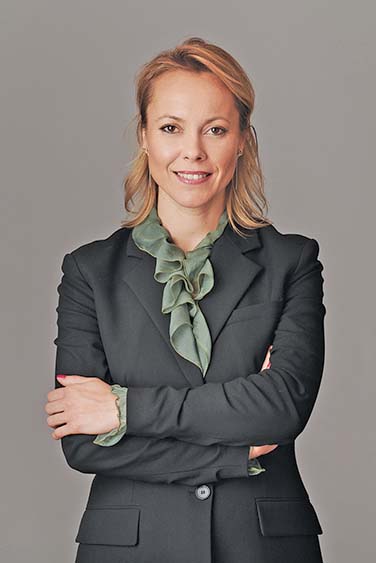COVID-19 brought numerous changes to almost all areas of our lives. We spoke with experts from top tax advisory and auditing firm LeitnerLeitner about the impact of the pandemic on digi-talisation, tax policy, HR and auditing, and discovered that some of these changes have been for the best
Jelena Knežević, Partner, Leitner Leitner
Serbia Still Has Room For Progress

During the pandemic, and also in the post-covid period, the countries that have done a lot on digitalisation are the countries that rapidly and, in some ways successfully, confronted the situa-tion and now continue to operate under the new circumstances, making them more resilient. The Government of the Republic of Serbia recognised the importance of digitalisation and the development of e-government, which has contributed to significant development in this area over the past few years.
Digitalisation, as one of the priorities of the Serbian government, trans-forms the way the public administration works and elevates the country’s economy, transpar-ency and quality of work. The New system of fiscalization and the introduction of an electronic invoicing system represent another step forward in the digitalisation of operations; the idea is to speed up and simplify businesses’ operations, while it certainly also contributes significantly to the green agenda.
The White Book is just one of many mechanisms of the Foreign Investors Council for continuous and successful dialogue between the Government of Republic of Serbia and the business com-munity
Nevertheless, in addition to the reform efforts made at the state and local levels, Serbia still has room for progress in some areas of business. The latest publication of the Foreign Investors Council’s, the 2021 White Book, recommended, among other things, amending the property tax law and ensuring the valuation of property at a fair value for corporate income tax purposes, as well as facilitating the use of digital signatures to make them available to the largest number of citizens. The White Book is just one of many mechanisms of the Foreign Investors Council for continuous and successful dialogue between the Government of Republic of Serbia and the business community. The FIC acts jointly and never stops seeking new opportunities to contrib-ute and act as a unified voice and the driving force in the further development and improve-ment of the business environment.
Ivana Pavković, Senior Project Manager & HR/Payroll Manager
Workplaces Continue To Evolve In Response To Pandemic

The COVID-19 coronavirus became the accelerator for one of the greatest ever workplace transformations, most of all transforming the ways we work, learn and communicate, and, of course, changing where we work. The COVID-19 pandemic inspired and compelled HR leaders and their teams to think and adapt their work environment to the new circumstances. In early 2020, com-panies quickly transitioned to a remote work model. In-person teamwork shifted to online col-laboration methods.
The reality of working from home was unexplored territory for most em-ployees. HR managers were at the centre of these pandemic-generated changes from the be-ginning and had to face many new topics. They had to manage between new health and safety requirements, support managers under the new circumstances, reduce staffing in some cases, and keep up with a lot of technical requirements and administrative processes. Despite all these changes, the workplace continues to evolve in response to COVID-19 even after more than two years. As organisations and HR teams look ahead, it’s important to review what’s changed and how those changes will impact the future of business and serve to reinvent the role of HR.
Tanja Đurić, Senior Audit Manager
The Audit Profession Is Becoming More Digital

Global developments related to the COVID-19 pandemic have also impacted the work of audi-tors. Companies that are being audited are adjusting to the changing environment as it relates to their businesses and operations, including financial reporting processes, disclosures in finan-cial statements and their ability to maintain operations for the foreseeable future.
Correspond-ingly, auditors have had to adjust the ways they obtain sufficient appropriate audit evidence on which to base their audit opinion, amid challenges relating to, among other things, access to people or information, revising the identification and assessment of certain risks of material misstatement, and altering planned audit procedures or performing alternative or additional audit procedures as appropriate. If there is a positive side to this significant challenge for audi-tors, it is that the audit profession was already on a journey to becoming more digital, and pre-existing investments in digital capability have allowed many firms and practitioners to adapt to the new circumstances relatively quicker than other industries.
Tijana Djugumović Stojkić, Tax Manager
Tax Rate Increases Looming

Global developments related to the COVID-19 pandemic have also impacted the work of audi-tors. Companies that are being audited are adjusting to the changing environment as it relates to their businesses and operations, including financial reporting processes, disclosures in finan-cial statements and their ability to maintain operations for the foreseeable future.
Correspond-ingly, auditors have had to adjust the ways they obtain sufficient appropriate audit evidence on which to base their audit opinion, amid challenges relating to, among other things, access to people or information, revising the identification and assessment of certain risks of material misstatement, and altering planned audit procedures or performing alternative or additional audit procedures as appropriate. If there is a positive side to this significant challenge for audi-tors, it is that the audit profession was already on a journey to becoming more digital, and pre-existing investments in digital capability have allowed many firms and practitioners to adapt to the new circumstances relatively quicker than other industries.
